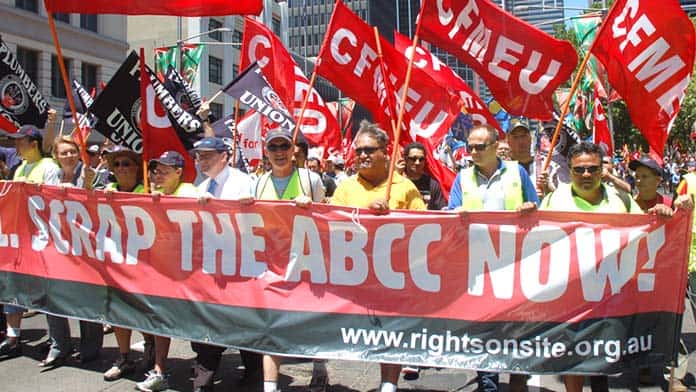One surprise since Labor’s election win in May is its immediate move to almost totally defund the anti-union Australian Building and Construction Commission (ABCC).
The ABCC’s 2022 budget of $35 million is being cut by $28 million this financial year, with virtually all its budget cut by 2025-26.
In addition, in late July Industrial Relations (IR) Minister Tony Burke announced the stripping of almost all of the ABCC’s powers via regulation, and the winding back of the Federal Building Code of Practice.
The Code banned terms from workplace agreements such as paying labour hire workers the same as full-time employees doing the same work, allowing union flags to be flown on government-tendered construction sites, or union stickers the size of a match box on hardhats.
The ABCC was established to police industrial laws in the Fair Work Act as well as additional laws for the construction industry designed to make effective union organising and strike action illegal, through the use of special powers to uncover even the most trivial breach of the laws. The construction industry was targeted due to the strength of construction industry unions like the CFMEU.
It relentlessly pursued not just the unions themselves but individual union members and officials over the use of industrial action. The ABCC has hit individual workers with more than 250 personal fines worth over $530,000 since it was reinstated in 2016.
Its systematic anti-union bias has been slapped down by the courts on a number of occasions. Former NRL player and CFMEU ACT official John Lomax won a court payout after the ABCC dragged him through the courts on false charges of blackmail. In another example it prosecuted a union delegate on the Melbourne Metro Tunnel Project after he told workers in 2019 to stop work over safety concerns about first aid facilities on site. The judge slammed the ABCC’s actions in bringing the case as “verging on improper”.
The industrial laws allow building unions to be prosecuted for any “coercive behaviour” towards building companies outside the very limited “bargaining period” when a workplace agreement expires every three or four years.
Every strike or union campaign is a form of coercion, an attempt to apply pressure on builders to force agreement on some issue. Coercing the bosses to sign union agreements is how the unions were built.
In one recent case in the Federal Court, the ABCC prosecuted the CFMEU for “coercion” for demanding a building company supply female toilets on a building site.
The ABCC and the special laws that applied only to construction workers were first put in place by the Liberals in October 2002 on the flimsiest of pretexts, before a rotten Royal Commission set up to justify it, headed by Terence Cole, even gave its final report to Parliament in February 2003. It was initially called the Building Industry Taskforce (BIT).
Not one union official was ever charged as a result of the findings of the Cole Commission.
The process was kicked off by Liberal PM John Howard’s Industrial Relations Minister, Tony Abbott, after a secret ten-page report was handed to him by Jonathan Hamberger, Peter Reith’s former advisor during the lock out of the MUA by Patrick stevedores in 1998. The whole exercise was nothing but an anti-union exercise to benefit the Liberals’ building company mates.
Finish it off
In order to abolish the ABCC in full, Labor will have to pass legislation through Parliament later this year.
While officially Dave Noonan, the national secretary of the CFMEU, and Michael Wright, the assistant national secretary of the Electrical Trades Union, have welcomed the decision to defund the ABCC, there is plenty of scepticism within the union that Labor will finally end the ABCC.
Labor had the chance to do so after the election of Kevin Rudd in 2007 and refused.
Back then, Labor only got rid of the worst aspects of the ABCC, rolling its powers into the Fair Work Building Industry Inspectorate. That body still prosecuted the CFMEU for routine union organising and industrial action, much of which is still illegal under the Fair Work Act Labor introduced.
Today IR Minister Burke today hints at something similar, saying, “A lot of what it’s [the ABCC] been doing can appropriately be done by another regulator.”
The Fair Work Ombudsman will take over all the ABCC’s current 39 cases against the unions.
At least when Rudd rolled the ABCC into Fair Work his government directed that all the ABCC’s cases be settled without going to court.
The CFMEU has put its faith in the election of a Labor government as the way to abolish the ABCC, only mobilising union members for occasional set piece strikes against it.
The union has never been willing to seriously target building companies that call in the ABCC during industrial disputes, nor has it sought to escalate strikes against them into company-wide ones.
The union has paid over $14.7 million in court fines, even raising members’ union dues to do so, seeing them as “the cost of doing business” for the union.
Even when Malcolm Turnbull won the July 2016 election and breathed new life into the ABCC, the CFMEU officials argued they were right to waste their time lobbying cross-bench Senators including from Pauline Hanson’s One Nation, the Nick Xenophon Team and Derryn Hinch to block Turnbull’s bill, rather than beginning serious, sustained strike action.
Now the ABCC may go, but Labor may replace it with another similar body with weaker powers. And most of the laws against strike action, union right of entry and “coercion” will remain.
Building unions need to prepare for a serious fight to win the right to strike, and to get rid of all the restrictive laws and inspectorate bodies set up to police the unions. That means being willing to fight Labor.
By a CFMEU member






